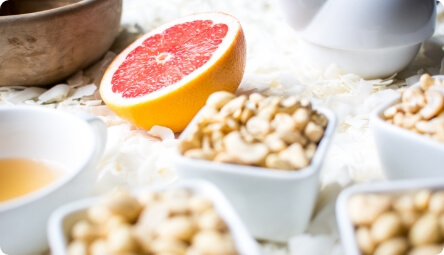يمكن أن يساعد الحصول على التغذية الصحيحة في تسريع العلاج والوقاية تشمل المناعة الصحية. السل (TB) هو مرض معد تسببه بكتيريا Mycobacterium tuberculosis (MTB). يؤثر السل بشكل عام
أكل الحق للتغلب على مرض السل
السل (TB) هو مرض معد تسببه بكتيريا Mycobacterium tuberculosis (MTB). يؤثر السل بشكل عام على الرئتين ، ولكن يمكن أن يؤثر أيضًا على أجزاء أخرى من الجسم. تتمثل الأعراض التقليدية لمرض السل النشط في السعال المزمن المصحوب بالبلغم المحتوي على الدم والحمى والتعرق الليلي وفقدان الوزن. تشمل العلامات والأعراض العامة الحمى والقشعريرة والتعرق الليلي وفقدان الشهية وفقدان الوزن والإرهاق. قد تحدث أيضًا تعجر الأظافر بشكل كبير يُعتقد أن ثلث سكان العالم مصابون بالسل. تحدث إصابات جديدة في حوالي 1٪ من السكان كل عام ، وفي عام 2014 ، كان هناك 9.6 مليون حالة إصابة بالسل النشط مما أدى إلى 1.5 مليون حالة وفاة.
يرتبط السل ارتباطًا وثيقًا بكل من الاكتظاظ وسوء التغذية ، ومن ثم فإن الأشخاص المعرضين لخطر كبير هم: الأشخاص الذين يحقنون المخدرات غير المشروعة ، والسكان ، والعاملين في المناطق التي يتجمع فيها الأشخاص المعرضون للخطر (مثل السجون وملاجئ المشردين) ، والمجتمعات المحرومة طبياً والفقيرة الموارد ، والمرتفعة - الأقليات العرقية المعرضة للخطر ، والأطفال على اتصال وثيق بالمرضى من الفئات المعرضة للخطر ، ومقدمي الرعاية الصحية الذين يخدمون هؤلاء المرضى. مرض الرئة المزمن هو عامل خطر كبير آخر. يزيد السحار السيليسي من خطر الإصابة بحوالي 30 ضعفًا. أولئك الذين يدخنون السجائر لديهم ما يقرب من ضعف خطر الإصابة بالسل مقارنة بغير المدخنين. الأشخاص الذين يعانون من سوء التغذية أو نقص الوزن هم أكثر عرضة للإصابة بالسل ،
يمكن أن يؤدي سوء التغذية إلى نقص المناعة الثانوي الذي يزيد من تعرض المضيف للعدوى. في مرضى السل يؤدي إلى انخفاض الشهية وسوء امتصاص المغذيات ،

* Good quality protein in the diet protein makes the immunity cells strong as it’s a building block of the body. Protein deficiency may have a particular detrimental effect on the ability of the body to fight tuberculosis. Choose dairy, lean meats, pulses, beans. Eat 2-3 portions daily.
* Daily include at least a source of an antioxidant from colored fruits
* Keep fibers in your diet in the form of whole grain cereals, pulses and germinated legumes which helps to keep gut healthy and removes bad toxins, bad fat from diet.
* Choose a healthy form of fat which is unsaturated oil over saturated oil like olive oil, sunflower oil instead of butter or margarine.
Role of micronutrients
Zinc
Various studies on patients with tuberculosis had shown significantly lower plasma zinc level than those without tuberculosis, irrespective of their nutritional status. An adequate supply of zinc may also limit free radical membrane damage during inflammation.
Your diet should include nuts, beans, fish, lean meat, mushroom, spinach.
Vitamin A
It has been shown that vitamin A has immunocompetent role in human tuberculosis. Vitamin A was reported to inhibit multiplication of virulent bacilli in cultured human macrophages.
Vitamin A is essential for normal functioning of T and B lymphocytes, macrophage activity, and generation of antibody response
Red and orange colored fruits and vegetables should be included on daily basis.
Vitamin D
Vitamin D plays a role in the function of macrophages, and a key factor in host resistance in tuberculosis.
Vit D fortified food includes eggs, fish like tuna, mackerel.
Selenium
The essential trace element selenium has an important function in maintaining the immune processes and thus may have a critical role in clearance of mycobacteria. Selenium has been found as significant factor in the relative risk for developing mycobacterial diseases in HIV positive patients.
Nuts and nut seeds in a moderate quantity should be taken twice a week.
Iron
There are two explanations for the association of low iron status and infection. One is that anemia results from chronic infection and the other is that iron deficiency would increase susceptibility to infection such as tuberculosis.
Green leafy vegetables with a piece of lemon is a healthy tip to enhance iron absorption in body.
Polyunsaturated fatty acids
In a research study, It was concluded that supplementing the diet with (n-3-) fatty acids can affect resistance to M. tuberculosis, whereas supplementing with (n-6-) fatty acids does not.
Combination of olive oil, nuts and cooking oil like sunflower, cottonseed oil, rice bran oil are best.


